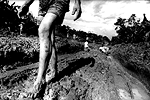
Note: The MoJo Wire’s presentation of “World With a View” includes additional winners (not pictured in Mother Jones magazine) from the United States, Nigeria, and Algeria.
Every year, the Mother Jones International Fund for Documentary Photography awards grants to photographers from around the world. The following images represent four of this year’s winners, all of whom trained their cameras — like CNN with a conscience — on global change.
Like a Baby’s First Words
Ljalja Kuznetsova
Our top winner received our 1997 Leica Medal of Excellence.
For hundreds of years, Russia has tried to control  the nomadism of its Gypsy tribes. Kazakhstan native Ljalja Kuznetsova began photographing the Liuli Gypsies 20 years ago.
the nomadism of its Gypsy tribes. Kazakhstan native Ljalja Kuznetsova began photographing the Liuli Gypsies 20 years ago.
“In their company,” says Kuznetsova, “I caught occasional glimpses of an inner life, [which became for me] a metaphor for freedom and free will.” She compares the sense of revelation in this photo of Liuli boys and a dove to “a baby’s first words.”
Iranian Strongman
Mohammad Eslami-Rad
Introduced through Italian Hercules films in the 1960s,  bodybuilding has flourished in Iran despite Islamic law, which strictly forbids the display of bare skin. In part, bodybuilding’s popularity can be traced to an ancient Iranian sport called Varzesh-e Baastaani, which involves weight lifting and wrestling to live music.
bodybuilding has flourished in Iran despite Islamic law, which strictly forbids the display of bare skin. In part, bodybuilding’s popularity can be traced to an ancient Iranian sport called Varzesh-e Baastaani, which involves weight lifting and wrestling to live music.
Mohammad Eslami-Rad has been photographing the changing face of his country since the 1970s, capturing the clash and commingling of cultures. “I am documenting the history of my country and my people, which is not truly known in foreign media because the door is closed to them and, in many cases, closed to me.”
Captives of Progress
Wu Jialin
There is a tradition among elderly men in China’s Yunnan province  of “walking” their caged exotic songbirds. By swinging the cages from side to side as they socialize with friends, the men exercise their birds by forcing them to tighten their grip on their perches. Despite strong traditions practiced by its 25 ethnic minorities, Yunnan province is quickly modernizing. China is currently pushing for the construction of trade routes through this once-remote region, which borders Burma, Laos, and Vietnam. That transformation has brought its share of problems, including drugs, AIDS, and prostitution.
of “walking” their caged exotic songbirds. By swinging the cages from side to side as they socialize with friends, the men exercise their birds by forcing them to tighten their grip on their perches. Despite strong traditions practiced by its 25 ethnic minorities, Yunnan province is quickly modernizing. China is currently pushing for the construction of trade routes through this once-remote region, which borders Burma, Laos, and Vietnam. That transformation has brought its share of problems, including drugs, AIDS, and prostitution.
“The mountain folks of Yunnan are in progress, and I am trying to keep pace with them,” says Jialin.
Road to Nowhere
Paula Sampaio
In the 1970s, Brazil’s military dictatorship ordered the construction of the Trans-Amazonian Highway and offered free land and agricultural subsidies in hopes of developing the rainforest. Thousands of poor people jumped at the offer, only to discover that some of their land was in the middle of rivers; few subsidies were available; and the road was often impassable during the rainy season. Today, the road stretches about 5,000 kilometers and appears from above as a rip in the rainforest’s green canopy.
of the Trans-Amazonian Highway and offered free land and agricultural subsidies in hopes of developing the rainforest. Thousands of poor people jumped at the offer, only to discover that some of their land was in the middle of rivers; few subsidies were available; and the road was often impassable during the rainy season. Today, the road stretches about 5,000 kilometers and appears from above as a rip in the rainforest’s green canopy.
“From the ground,” says Sampaio, who lived along the highway as a child, “it is testimony to failed promises and broken hopes.”


















